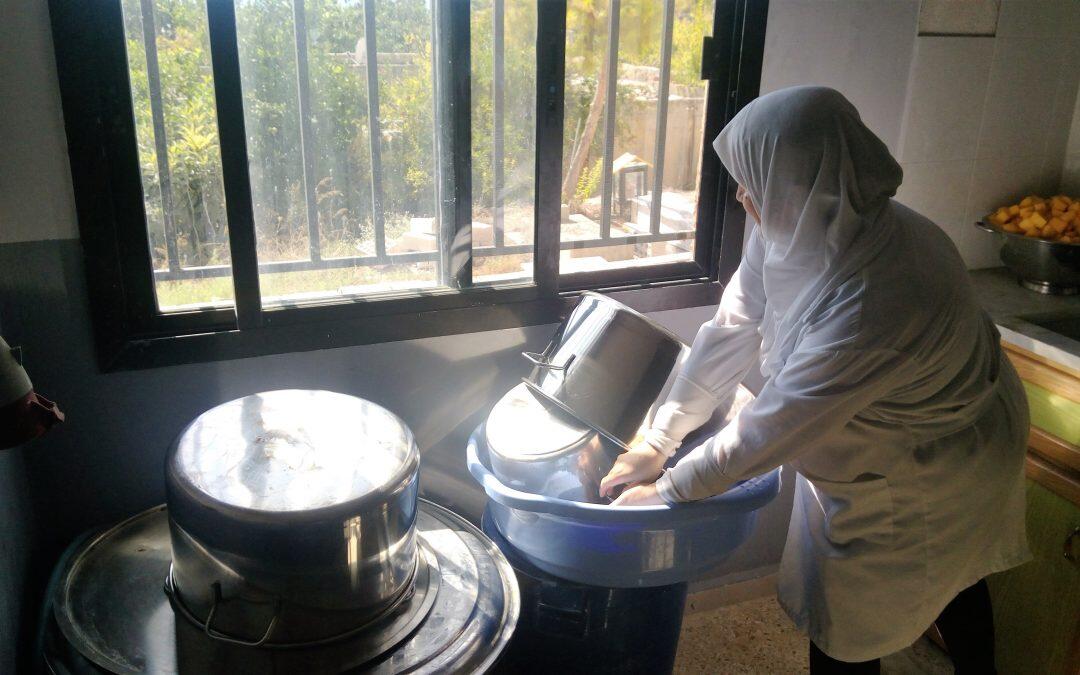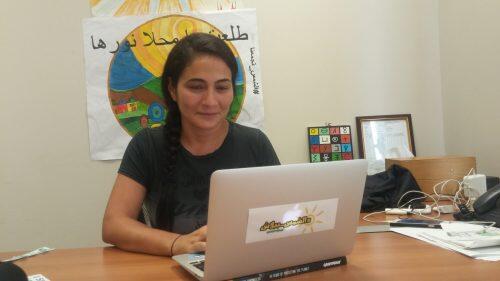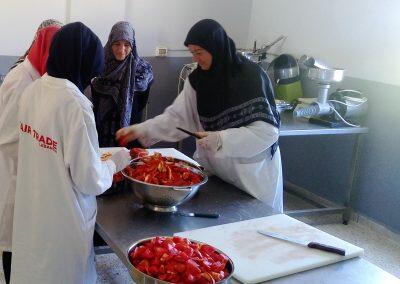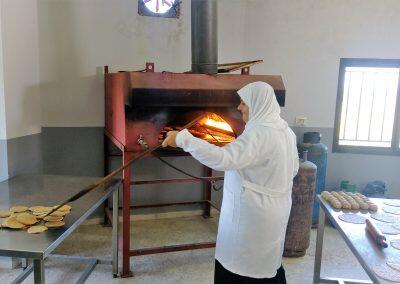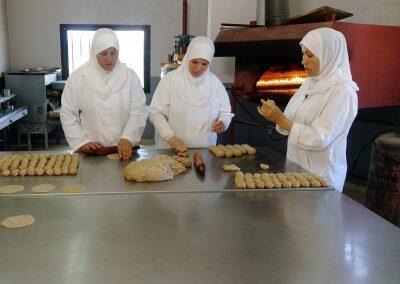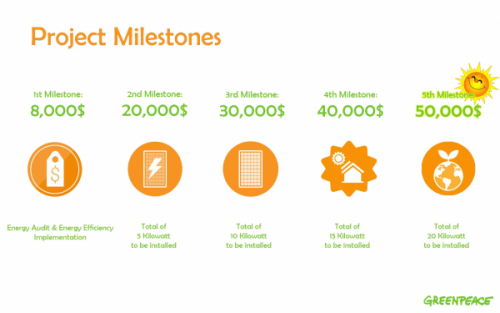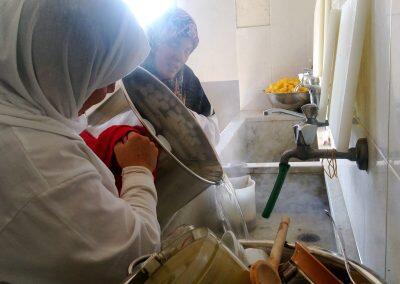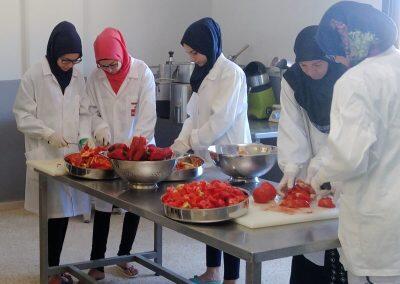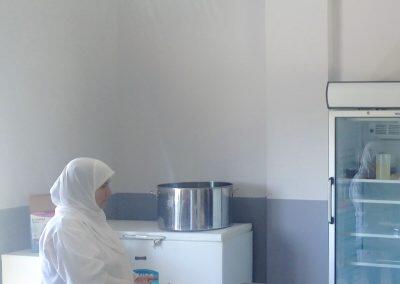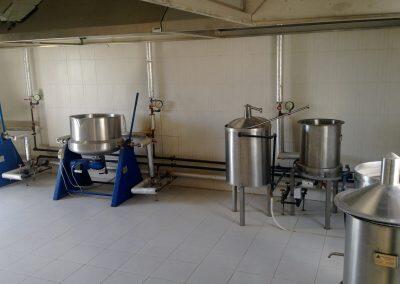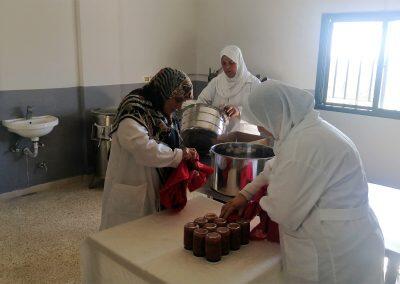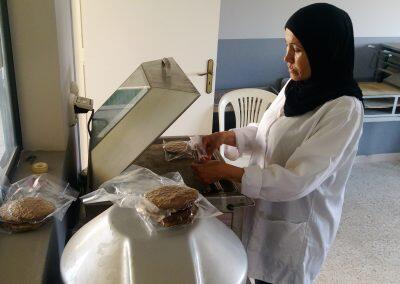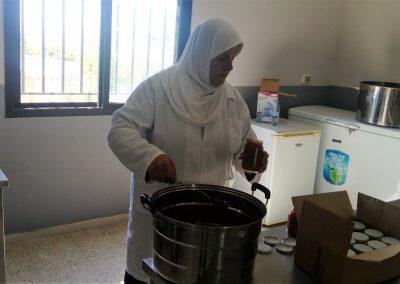Anyone who is interested in accomplishing two goals at a time, might be interested in this article. If you see that empowering women is important, and care about the future of our planet Earth, then go on, and donate on the following link… You would be helping solarize a women cooperative in Deir Qanoun- Ras al-Ain, in Tyre – South of Lebanon, and facilitate the work of many families, while empowering hard working lovely women at the same time.
Here comes the sun!
I first met Daad Ismail, one of the women in the cooperative, on Greenpeace’s “Rainbow Warrior” ship. She is passionate for her work, and makes, along with her colleagues, delicious and healthy products. However, the ongoing power shortage in Lebanon is preventing the “Cooperative for agricultural production and manufacturing” from increasing their produce.
In an interview with “Greenarea.me”, Daad, one of the women in the cooperative, said: “We really need solar energy in our coop”, adding “After Greenpeace visited our coop, and conducted a study to determine our need for clean energy, they decided that this project could be done”.
In the co-op, Daad, along with many other women make traditional foods in a rural area called Deir Qanoun- Ras al-Ain, in Tyre – South of Lebanon. Before Greenpeace’s visit, Ismail knew that THE SUN (solar energy) would allow her and her colleagues to increase their produce. She also told us about her interest in contributing in helping the environment through solar energy.
“Unfortunately, many products are being ruined, because there is lots of power shortage”, Daad said. “On the other hand, the work which is done manually (most of it), would be facilitated through machines, if our co-op was solarized”.
The women work a minimum of 10 hours per day, depending on the work needed. The cooperative’s budget last year was 32 million LBPS. The lovely hardworking women sell their products in exhibitions and street markets.
But why would someone contribute in crowdfunding?… Well, Daad thinks that you should donate if you believe in empowering women who are so eager to help their communities, and who work on being economically independent. “These are the cooperative’s goals”, she said.
How is power shortage affecting the work at the co-op though?… Daad explains that “the electricity bill is very high despite the power shortage. In addition to that, sometimes we have to stop working half way through due to power shortage”.
Daad looks forward to having solar energy 2 months from now….
Debunking the myths… YES, IT IS POSSIBLE!
In an interview with “greenarea.info”, Ghalia Fayad, Arab World Program Leader at “Greenpeace”, talked to us about the solar energy campaign and crowdfunding the International environmental organization is doing to empower women in Rural areas, while benefiting the environment at the same time.
Ghalia said: “This project is part of our climate and energy campaign, which aims at the promotion of renewable energy, and specifically solar energy,” adding “we started the campaign with lots of awareness, and we brought the information of the availability of solar energy, debunking the myths around the impossibility of having free renewable energy”.
“We wanted to let people know that they can do it by themselves, and by that, we are encouraging them to go beyond waiting for a national plan to empower this sector”, she added.
“So, we brought the information of how this could be done, in addition to the green loans that are available from Lebanese banks, in order to encourage small scale initiatives”.
The crowd funding project is part of an extra milestone in Greenpeace’s work, meaning that “we actually act in order to start making a difference and to start showing life examples, such as showing that this solarization project is possible”, Ghalia said.
Ghalia Fayad, Arab World Program Leader at “Greenpeace”. (Picture: Greenarea.me)
Why Crowdfunding?
Greenpeace chose crowdfunding because they wanted to engage people… so that they become part of a dream that comes true”, Ghalia said, adding “when we started thinking that we should move on to actual projects, we started with transfer of skills, building know-how, and training solar technicians”.
Fayad also stressed that “Greenpeace studied areas where this need was essential… so of course we went to rural areas, which suffer from power shortage that can reach 22 hours/day”.
“When we were working on organizing which the municipalities and technical schools to get people who could become solar technicians, we ended up with only men… So together with the community we worked with, we thought of working on a project where we could show the results, and where we could serve the community around”.
Gender Balance…
“While doing this mapping, we found this women’s cooperative. For us, it’s like a balance, regarding gender balance, since the same project benefits both… In addition to that, the women we met are really hard working women who don’t have much resources. They are women who are raising their kids while working in the cooperative as well. Even the machines they were granted, cannot be used… since there is no electricity to use them. So, they do not use any machines, and they do all the work manually”, Ghalia said.
Since women in that cooperative are doing their tasks manually, then their production is limited. It is great to hear that the direct beneficiaries from the co-op (more than 24 families) could increase their produce if machines were used, especially that the work would take a less amount of time than if it was done manually.
“This is one perfect example of hard working women who really want to make a difference in their families and their communities. They are also eager to become environmental, and they see it as a key aspect of the project”, Ghalia told us.
Where has the project reached?… When will the crowdfunding end?
Greenpeace chose Zoomal as the crowdfunding platform. Together, we should all collect USD50,000, so that the cooperative becomes 100% running on solar energy.
So far, we could say that there is engagement, but it takes time until more people hear about it, and know what it really is. Ghalia said: “That is why when someone donates, it is really important that he/she shares it on Twitter of Facebook… especially that we would be interested in donating to something/someone when someone else we know does it”.
What about the Milestones reached?
There are several milestones to reach in this project:
- 8,000 dollars (energy audit and energy efficiency implementation)
- 20,000 dollars (5kw installed)
- 30,000 dollars (10 kw installed)
- 40,000 dollars (15 kw installed)
- 50,000 dollars (20 KW installed) …. And this is when the cooperative becomes fully solar powered.
Once a solar power system is installed; it’s life span period would be 30 years… So, there would be no electricity bills for 30 years.
Greenpeace is encouraging the shift towards solar energy… What else?
According to Fayyad, “Greenpeace is providing all the marketing for the campaign whether on social media or any other platform,” adding “We also helped in doing the study, and we will help in installing the solar energy system, with the guidance of a renewable energy expert (Nader al-Hajj Chehade)”.
“We should also make sure that the PV systems that are to be bought would be of great quality, and training the solar technicians in the region contributed in bringing people together (Syrian, Lebanese, and Palestinian solar technicians).
What about women’s collaboration regarding the solar energy project?
There was a training in the rural areas on solar energy, that is why women now know a lot about it. Since they have very little power supply, they view the project as bringing a solution for a vital chronic problem.
Usually, People who are mostly affected by a certain problem, are the ones to be the most eager to change it.
Arab World Program Leader also told “greenarea.info”: “We sensed that “the women have environmental awareness, perhaps because they live close to nature. Perhaps, we added the technicalities only, but there is environmental awareness”.
For example, women are aware that diesel is bad for the environment, especially when they see the smoke.
Is this project being done in Lebanon only?
This project is being done in countries where there is lots of sun, but there is very unstable economy such as Greece (that is now financially unstable), and it really resonated well in that country, in addition to Brazil (trainings and ToT), Congo, North Carolina, Kinshasa, etc.…
Who is participating in Crowdfunding?
People from many countries other than Lebanon are participating in the crowdfunding, and Greenpeace Lebanon is contacting the environmental organization’s offices in other countries, in order to drive their supporters to participate in crowdfunding the project as well.
It’s true that it’s a local project, but it has global resonance, especially that Lebanon is not a stable country, and there are many areas in it suffering from conflicts. That is why it is important for people in other regions to support projects in Lebanon; they would be contributing to the stability and resilience for people in their societies.
We also asked Ghalia if Greenpeace is thinking of providing Syrian refugees in Lebanon with solar energy. She answered that many of the men that were trained on solar energy live in Palestinian or Syrian refugee camps. So, they might pass the project to their communities.
Ghalia also mentioned that Greenpeace has done this type of projects in many parts of the world… but this is a pilot project… and if the women’s cooperative is fully solarized, and becomes a success story, “we would easily work on other projects in the region”.
Have you clicked the link to donate or not yet?… Go on! For empowering women and for solar energy!

